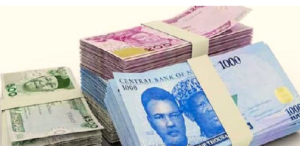Naira Falls: Nigeria’s Currency Among the Worst in the World—What Happens Next?
Naira Falls: Nigeria’s Currency Among the Worst in the World—What Happens Next?

According to a Bloomberg report, Nigeria’s naira has been classified as one of the worst-performing currencies globally. Its poor showing aligns with other struggling African currencies, such as the Zambian kwacha and Angolan kwanza, with five African currencies appearing in the bottom ten.
The report highlights several factors contributing to the naira’s decline, including economic difficulties, fluctuating commodity prices, inflation, and insufficient dollar liquidity. These challenges have significantly impacted the performance of African currencies.
Keonethebe Bosigo, a portfolio manager at Mazi Asset Management, attributed the naira’s struggles to inadequate currency management and systemic imbalances. “While oil prices play a role, the core issues are poor currency management and misalignments,” he stated. Bosigo noted that the naira’s overvaluation and loss of confidence stem from its inability to adjust appropriately.
Irmgard Erasmus, an economist with Oxford Economics, agreed, indicating that the naira continues to face intense pressure despite efforts to liberalize the current account. “The naira is undervalued relative to its long-term neutral value due to ongoing liquidity issues,” she explained. Erasmus pointed to falling Brent crude prices, stricter banking regulations, and general risk aversion as additional challenges.
He suggested that, without market distortions, the naira should trade closer to N1,100 per dollar, rather than its current rate of N1,544. However, he warned that unless there are substantial policy changes and enhanced dollar liquidity, the naira’s future remains precarious.
### Economic Implications of the Naira’s Decline
The naira’s downturn carries significant ramifications for Nigeria’s economy:
1. Inflationary Pressures: A weaker naira exacerbates inflation, diminishing purchasing power and lowering living standards.
2. Reduced Investor Confidence: Currency instability discourages foreign investment, stifling economic growth.
3. Higher Import Costs: A depreciated naira increases the cost of imports, potentially worsening inflation.
4. Economic Instability: A faltering currency undermines economic stability, raising the risk of downturns.
Path Forward for the Naira
To mitigate the naira’s decline, experts recommend:
1. Monetary Policy Reforms
2. Enhanced Dollar Liquidity
3. Current Account Liberalization
4. Fiscal Discipline
As Nigeria confronts its currency challenges, it is crucial for the government to enact prompt and effective reforms to stabilize the naira and rejuvenate the economy.
TRENDING SONGS
 RCCG PASTOR ANGRY OVER CALLING Him“MR” INSTEAD OF “DR,” DECLARES CURSE ONLINE
RCCG PASTOR ANGRY OVER CALLING Him“MR” INSTEAD OF “DR,” DECLARES CURSE ONLINE
 NPMA Appeals to Nigerian Government for Compensation After Lagos Market Fire
NPMA Appeals to Nigerian Government for Compensation After Lagos Market Fire
 Rest Every Four Hours, FRSC Issues Safety Guide for Fasting Motorists
Rest Every Four Hours, FRSC Issues Safety Guide for Fasting Motorists
 NNPC Boss Ojulari Bags UK Energy Institute Fellowship
NNPC Boss Ojulari Bags UK Energy Institute Fellowship
 Shock in Anambra: Bride Disappears Moments Before Wedding
Shock in Anambra: Bride Disappears Moments Before Wedding
 Nigerian Woman Returns ₦330 Million Accidentally Credited to Her Account
Nigerian Woman Returns ₦330 Million Accidentally Credited to Her Account
 APC Don Reach Morocco?’ VeryDarkMan Reacts to Seyi Tinubu Poster
APC Don Reach Morocco?’ VeryDarkMan Reacts to Seyi Tinubu Poster
 Bride Breaks Down in Tears as Wedding Meals Were Kept Secretly While Guests Go Home Hungry
Bride Breaks Down in Tears as Wedding Meals Were Kept Secretly While Guests Go Home Hungry
 Odogwu by Day, Robber by Night: How Marriage Joy Turned Into Tragedy
Odogwu by Day, Robber by Night: How Marriage Joy Turned Into Tragedy
 Nigerian Officials Allegedly Pocket N4–6B Weekly Through Smuggling Cartels at Seme–Badagry Border
Nigerian Officials Allegedly Pocket N4–6B Weekly Through Smuggling Cartels at Seme–Badagry Border
Share this post with your friends on ![]()













